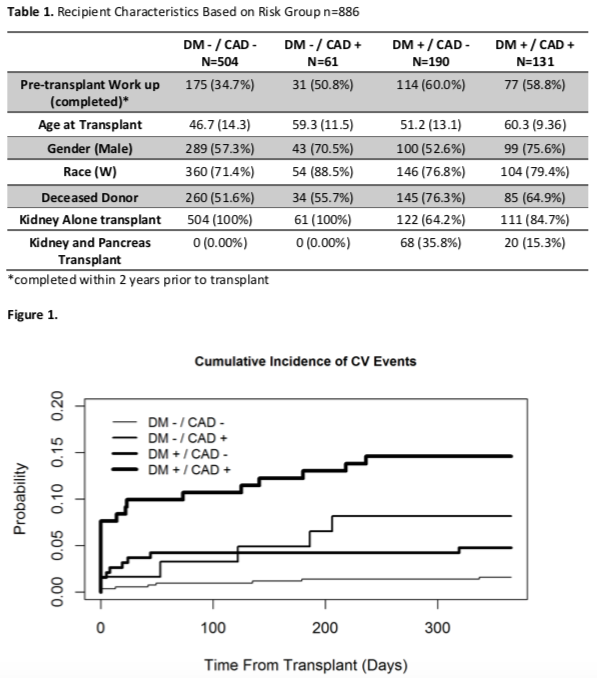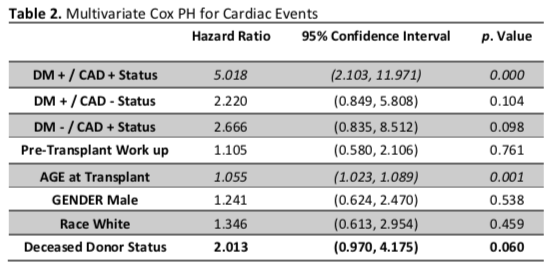Pre-Transplant Cardiac Work Up Does Not Predict Post-Transplant Cardiac Events at One Year among Kidney and Pancreas Transplant Recipients
S. M. Riad1, S. Konety1, S. Jackson2, N. Raj1, V. Vakil1, D. Keys1, E. Finger3, R. Spong1
1Medicine, University of Minnesota, Minneapolis, MN, 2Complex Care Analytics, Fairview Health Services, Minneapolis, MN, 3Surgery, University of Minnesota, Minneapolis, MN
Meeting: 2019 American Transplant Congress
Abstract number: 541
Keywords: Heart, Kidney/pancreas transplantation, Risk factors
Session Information
Session Name: Concurrent Session: Kidney: Cardiovascular and Metabolic III
Session Type: Concurrent Session
Date: Tuesday, June 4, 2019
Session Time: 4:30pm-6:00pm
 Presentation Time: 5:30pm-5:42pm
Presentation Time: 5:30pm-5:42pm
Location: Ballroom C
*Purpose: Death with functioning kidney allograft due to cardiovascular etiology is among the leading causes of kidney allograft loss after transplantation. Current cardiac work up recommendations vary widely across societies guidelines and center practices. We sought to evaluate the impact of cardiac risk stratification pre-transplant on cardiovascular events post transplantation.
*Methods: Retrospective analysis of 886 primary kidney and kidney pancreas recipients from a single center between 2013 and 2017. Recipient were grouped into four risk groups based on presence of DM and CAD pre-transplant. Recipients characteristics by risk group are listed in (Table 1). Kaplan-Meier curves were produced to compare cumulative incidence of cardiovascular events (defined as the first Catheterization, PCI, CABG, or MI) within the first-year post-transplant between the four risk groups. Multivariate analysis was performed using a Cox proportional hazards model adjusted for risk group, age, gender, race, living donor and cardiac work up (Catheterization, Lexiscan or dobutamine ECHO) between referral and transplant.
*Results: The cumulative incidence of cardiac events was the highest in the DM + / CAD + group (15%) and lowest in the DM – / CAD – group (2%). Overall the incidence of events was significantly different between groups (log-rank p<0.001, Figure 1). In the multivariate analysis the risk of CV events was five times higher in the DM + / CAD + group compared to DM - / CAD - (HR 5.02 (2.10, 11.97), p<0.001). Deceased donor recipients had higher risk but only at the 10% significance level (Table 2).
*Conclusions: Post-transplant cardiovascular events are common among diabetics with history of coronary artery disease. Cardiac work up between referral and transplant was not a predictor of outcome in our study. These results call for revisiting the guidelines to focus on the high-risk group and perhaps limit testing for low and intermediate risk groups.
To cite this abstract in AMA style:
Riad SM, Konety S, Jackson S, Raj N, Vakil V, Keys D, Finger E, Spong R. Pre-Transplant Cardiac Work Up Does Not Predict Post-Transplant Cardiac Events at One Year among Kidney and Pancreas Transplant Recipients [abstract]. Am J Transplant. 2019; 19 (suppl 3). https://atcmeetingabstracts.com/abstract/pre-transplant-cardiac-work-up-does-not-predict-post-transplant-cardiac-events-at-one-year-among-kidney-and-pancreas-transplant-recipients/. Accessed February 22, 2026.« Back to 2019 American Transplant Congress


